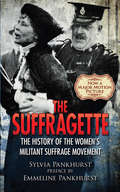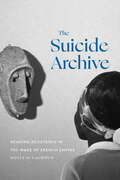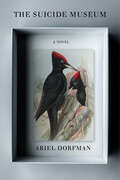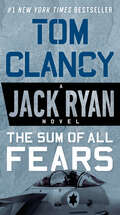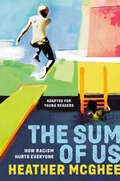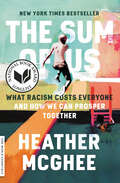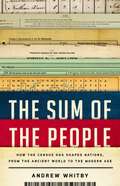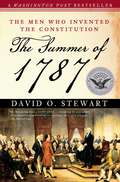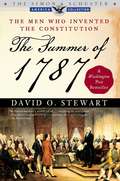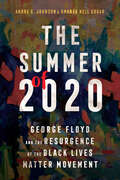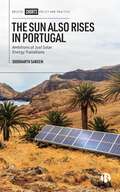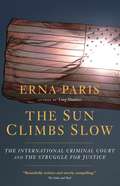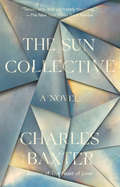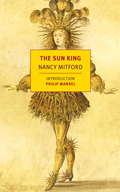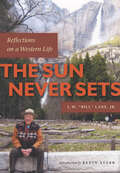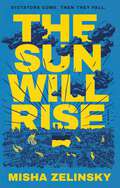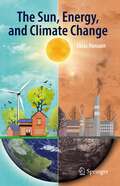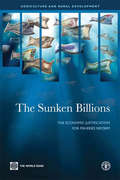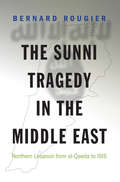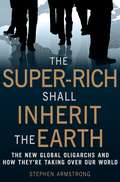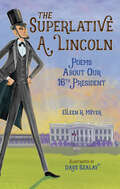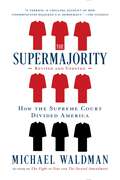- Table View
- List View
The Suffragette: The History of the Women's Militant Suffrage Movement
by Sylvia Pankhurst Emmeline PankhurstBy 1903, more than fifty years of peaceful campaigning had brought British women no closer to attaining the right to vote. In that year activist Emmeline Pankhurst founded the Women's Social and Political Union, a militant organization dedicated to achieving women's suffrage. The union's motto, "Deeds not words," reflected its radical approach, consisting of stone-throwing, window-breaking, arson, and physical confrontation with authorities.The Suffragette, written by Emmeline Pankhurst's daughter, Sylvia, offers an insider's perspective on the union's growth and development as well as the motives and ideals that inspired its leaders and followers. She chronicles the protesters' tactics as well as the consequences of their actions: arrests, imprisonment, hunger strikes, and the mental and physical ordeals of forced feeding. Vintage photographs illustrate the demonstrations, courtroom trials, and other dramatic incidents from the history of the women's militant suffrage movement.
The Suicide Archive: Reading Resistance in the Wake of French Empire
by Doyle D. CalhounThroughout the French empire, from the Atlantic and the Caribbean to West and North Africa, men, women, and children responded to enslavement, colonization, and oppression through acts of suicide. In The Suicide Archive, Doyle D. Calhoun charts a long history of suicidal resistance to French colonialism and neocolonialism, from the time of slavery to the Algerian War for Independence to the “Arab Spring.” Noting that suicide was either obscured in or occluded from French colonial archives, Calhoun turns to literature and film to show how aesthetic forms and narrative accounts can keep alive the silenced histories of suicide as a political language. Drawing on scientific texts, police files, and legal proceedings alongside contemporary African and Afro-Caribbean novels, film, and Senegalese oral history, Calhoun outlines how such aesthetic works rewrite histories of resistance and loss. Consequently, Calhoun offers a new way of writing about suicide, slavery, and coloniality in relation to literary history.
The Suicide Museum: A Novel
by Ariel DorfmanA billionaire Holocaust survivor hires a writer to uncover the truth of Salvador Allende&’s death, and they must confront their own dark histories to find a path forward—for themselves and for our ravaged planet. An expansive, engrossing mystery for fans of Gabriel García Márquez, Margaret Atwood, and Bill McKibben, from the acclaimed author of Death and the Maiden.Ariel needed money, and Joseph Hortha had it. Bound by gratitude toward the late Chilean president and a persistent need to know whether murder or suicide ended his life during the 1973 coup, the two men embark on an investigation that will take them from Washington DC and New York, to Santiago and Valparaíso, and finally to London. They encounter an unforgettable cast of characters: a wedding photographer who can predict a couple&’s future; a policeman in pursuit of the serial killer targeting refugees; a revolutionary caught trying to assassinate a dictator; and, above all, the complex women who support them along the way, for their own obscure reasons. Before Ariel and Joseph can resolve a quest full of dangers and enigmas, they must help each other come to terms with guilt and trauma from personal catastrophes hidden deep in the past. What begins as an intriguing literary caper unfolds into a propulsive, philosophical saga about love, family, machismo, fascism, and exile that asks what we owe the world, one another, and ourselves. By boldly mixing fiction and reality, imagination and history, The Suicide Museum explores the limits of the novelistic genre, expanding it in an unsuspected and exceptional way.
The Sum of All Fears (A Jack Ryan Novel #5)
by Tom ClancyDon't Miss the Original Series Tom Clancy's Jack Ryan Starring John Krasinski!The search for a stolen nuclear weapon on American soil sends Jack Ryan on a dangerous mission with global consequences in this #1 New York Times bestselling thriller.Peace may finally be at hand in the Middle East, as Jack Ryan, Deputy Director of Intelligence for the CIA, lays the groundwork for a plan that could end centuries of conflict. But ruthless terrorists have a final, desperate card to play: a nuclear weapon hidden somewhere in the United States.With one terrible act, distrust mounts, forces collide, and the floundering U.S. president seems unable to cope with the crisis. With the world on the verge of nuclear disaster, Ryan must frantically seek a solution—before the chiefs of state lose control of themselves and the world.
The Sum of Us (Adapted for Young Readers): How Racism Hurts Everyone
by Heather McGheeThe New York Times bestseller, now adapted for a new generation of young readers, leaders, thinkers, and activists. A groundbreaking call to action that examines how racism affects and harms all of us and how we need to face it head-on, together.The future can be prosperous for everyone, but only if we address the problems of racial and economic inequality.McGhee believes that all people, of all ages and all backgrounds, need to rethink their attitude toward race and strive together to create opportunities that benefit everyone. This book is a call to action. McGhee examines how damaging racism is, not only to people of color but also to white people. She offers hope and real solutions so we can all prosper. An expert in economic policy, McGhee draws lessons both from her work at a think tank and from her travels around the country talking to everyday Americans fighting for a more just and inclusive society.The people she meets prove how the stories we tell ourselves about race and belonging influence the policies that determine our shared economic future.The Sum of Us provides hope that with understanding and open-mindedness, the world can be more united and equitable than it is today.
The Sum of Us: What Racism Costs Everyone and How We Can Prosper Together
by Heather McGheeOne of today’s most insightful and influential thinkers offers a powerful exploration of inequality and the lesson that generations of Americans have failed to learn: Racism has a cost for everyone—not just for people of color. <P><P>Heather McGhee’s specialty is the American economy—and the mystery of why it so often fails the American public. From the financial crisis to rising student debt to collapsing public infrastructure, she found a common root problem: racism. But not just in the most obvious indignities for people of color. Racism has costs for white people, too. It is the common denominator of our most vexing public problems, the core dysfunction of our democracy and constitutive of the spiritual and moral crises that grip us all. But how did this happen? And is there a way out? McGhee embarks on a deeply personal journey across the country from Maine to Mississippi to California, tallying what we lose when we buy into the zero-sum paradigm—the idea that progress for some of us must come at the expense of others. Along the way, she meets white people who confide in her about losing their homes, their dreams, and their shot at better jobs to the toxic mix of American racism and greed. This is the story of how public goods in this country—from parks and pools to functioning schools—have become private luxuries; of how unions collapsed, wages stagnated, and inequality increased; and of how this country, unique among the world’s advanced economies, has thwarted universal healthcare. But in unlikely places of worship and work, McGhee finds proof of what she calls the Solidarity Dividend: gains that come when people come together across race, to accomplish what we simply can’t do on our own. <P><P>The Sum of Us is a brilliant analysis of how we arrived here: divided and self-destructing, materially rich but spiritually starved and vastly unequal. McGhee marshals economic and sociological research to paint an irrefutable story of racism’s costs, but at the heart of the book are the humble stories of people yearning to be part of a better America, including white supremacy’s collateral victims: white people themselves. With startling empathy, this heartfelt message from a Black woman to a multiracial America leaves us with a new vision for a future in which we finally realize that life can be more than a zero-sum game. <P><P><b>A New York Times Bestseller</b>
The Sum of the People: How the Census Has Shaped Nations, from the Ancient World to the Modern Age
by Andrew WhitbyThis fascinating three-thousand-year history of the census traces the making of the modern survey and explores its political power in the age of big data and surveillance.In April 2020, the United States will embark on what has been called "the largest peacetime mobilization in American history": the decennial population census. It is part of a tradition of counting people that goes back at least three millennia and now spans the globe.In The Sum of the People, data scientist Andrew Whitby traces the remarkable history of the census, from ancient China and the Roman Empire, through revolutionary America and Nazi-occupied Europe, to the steps of the Supreme Court. Marvels of democracy, instruments of exclusion, and, at worst, tools of tyranny and genocide, censuses have always profoundly shaped the societies we've built. Today, as we struggle to resist the creep of mass surveillance, the traditional census -- direct and transparent -- may offer the seeds of an alternative.
The Summer of 1787
by David O. StewartThe successful creation of the Constitution is a suspense story. The Summer of 1787 takes us into the sweltering room in which delegates struggled for four months to produce the flawed but enduring document that would define the nation -- then and now. George Washington presided, James Madison kept the notes, Benjamin Franklin offered wisdom and humor at crucial times. The Summer of 1787traces the struggles within the Philadelphia Convention as the delegates hammered out the charter for the world's first constitutional democracy. Relying on the words of the delegates themselves to explore the Convention's sharp conflicts and hard bargaining, David O. Stewart lays out the passions and contradictions of the often painful process of writing the Constitution. It was a desperate balancing act. Revolutionary principles required that the people have power, but could the people be trusted? Would a stronger central government leave room for the states? Would the small states accept a Congress in which seats were alloted according to population rather than to each sovereign state? And what of slavery? The supercharged debates over America's original sin led to the most creative and most disappointing political deals of the Convention. The room was crowded with colorful and passionate characters, some known -- Alexander Hamilton, Gouverneur Morris, Edmund Randolph -- and others largely forgotten. At different points during that sultry summer, more than half of the delegates threatened to walk out, and some actually did, but Washington's quiet leadership and the delegates' inspired compromises held the Convention together. In a country continually arguing over the document's original intent, it is fascinating to watch these powerful characters struggle toward consensus -- often reluctantly -- to write a flawed but living and breathing document that could evolve with the nation.
The Summer of 1787
by David O. StewartThe successful creation of the Constitution is a suspense story. The Summer of 1787 takes us into the sweltering room in which delegates struggled for four months to produce the flawed but enduring document that would define the nation -- then and now. George Washington presided, James Madison kept the notes, Benjamin Franklin offered wisdom and humor at crucial times. The Summer of 1787 traces the struggles within the Philadelphia Convention as the delegates hammered out the charter for the world's first constitutional democracy. Relying on the words of the delegates themselves to explore the Convention's sharp conflicts and hard bargaining, David O. Stewart lays out the passions and contradictions of the often painful process of writing the Constitution. It was a desperate balancing act. Revolutionary principles required that the people have power, but could the people be trusted? Would a stronger central government leave room for the states? Would the small states accept a Congress in which seats were alloted according to population rather than to each sovereign state? And what of slavery? The supercharged debates over America's original sin led to the most creative and most disappointing political deals of the Convention. The room was crowded with colorful and passionate characters, some known -- Alexander Hamilton, Gouverneur Morris, Edmund Randolph -- and others largely forgotten. At different points during that sultry summer, more than half of the delegates threatened to walk out, and some actually did, but Washington's quiet leadership and the delegates' inspired compromises held the Convention together. In a country continually arguing over the document's original intent, it is fascinating to watch these powerful characters struggle toward consensus -- often reluctantly -- to write a flawed but living and breathing document that could evolve with the nation.
The Summer of 1787
by David O. StewartThe Summer of 1787 takes us into the sweltering room in which the founding fathers struggled for four months to produce the Constitution: the flawed but enduring document that would define the nation--then and now.George Washington presided, James Madison kept the notes, Benjamin Franklin offered wisdom and humor at crucial times. The Summer of 1787 traces the struggles within the Philadelphia Convention as the delegates hammered out the charter for the world's first constitutional democracy. Relying on the words of the delegates themselves to explore the Convention's sharp conflicts and hard bargaining, David O. Stewart lays out the passions and contradictions of the, often, painful process of writing the Constitution. It was a desperate balancing act. Revolutionary principles required that the people have power, but could the people be trusted? Would a stronger central government leave room for the states? Would the small states accept a Congress in which seats were allotted according to population rather than to each sovereign state? And what of slavery? The supercharged debates over America's original sin led to the most creative and most disappointing political deals of the Convention. The room was crowded with colorful and passionate characters, some known--Alexander Hamilton, Gouverneur Morris, Edmund Randolph--and others largely forgotten. At different points during that sultry summer, more than half of the delegates threatened to walk out, and some actually did, but Washington's quiet leadership and the delegates' inspired compromises held the Convention together. In a country continually arguing over the document's original intent, it is fascinating to watch these powerful characters struggle toward consensus--often reluctantly--to write a flawed but living and breathing document that could evolve with the nation.
The Summer of 1787: The Men Who Invented the Constitution
by David O. StewartSuccessful creation of the Constitution is a suspense story. The Summer of 1787 takes us into the sweltering room in which delegates struggled for four months to produce the flawed but enduring document that would define the nation -- then and now. George Washington presided, James Madison kept the notes, Benjamin Franklin offered wisdom and humor at crucial times. The Summer of 1787 traces the struggles within the Philadelphia Convention as the delegates hammered out the charter for the world's first constitutional democracy. Relying on the words of the delegates themselves to explore the Convention's sharp conflicts and hard bargaining, David O. Stewart lays out the passions and contradictions of the often painful process of writing the Constitution. It was a desperate balancing act. Revolutionary principles required that the people have power, but could the people be trusted? Would a stronger central government leave room for the states? Would the small states accept a Congress in which seats were allotted according to population rather than to each sovereign state? And what of slavery? The supercharged debates over America's original sin led to the most creative and most disappointing political deals of the Convention. The room was crowded with colorful and passionate characters, some known -- Alexander Hamilton, Gouverneur Morris, Edmund Randolph -- and others largely forgotten. At different points during that sultry summer, more than half of the delegates threatened to walk out, and some actually did, but Washington's quiet leadership and the delegates' inspired compromises held the Convention together. In a country continually arguing over the document's original intent, it is fascinating to watch these powerful characters struggle toward consensus -- often reluctantly -- to write a flawed but living and breathing document that could evolve with the nation.
The Summer of 2020: George Floyd and the Resurgence of the Black Lives Matter Movement (Race, Rhetoric, and Media Series)
by Andre E. Johnson Amanda Nell EdgarIn the wake of George Floyd’s murder in May 2020, protests broke out in Minneapolis and quickly spread across the United States. National unrest led to the resurgence of the Black Lives Matter movement and added to calls for justice in other American cities, including Los Angeles, Atlanta, Tulsa, and Louisville, Kentucky, where only months earlier, Breonna Taylor was killed by police. By some estimates, BLM protesters numbered between fifteen million and twenty-six million in the US and abroad. The Summer of 2020: George Floyd and the Resurgence of the Black Lives Matter Movement spotlights the perspectives of individual participants who contributed to the movement’s revived impact and global success throughout 2020. Authors Andre E. Johnson and Amanda Nell Edgar interview the movement’s activists—from seasoned organizers to first-time protesters—to discover what Black Lives Matter meant to those who participated in one of America’s largest social movements. Johnson and Edgar’s fieldwork reveals the complexity of taking a stand, especially in the face of increasing threats from white supremacist groups, continuing police aggression, and a persisting global pandemic. In a time with unprecedented levels of political polarization, the wave of support for the Black Lives Matter movement powerfully disrupted that expectation. Without a clear sense of what led to the surge in support for Black Lives Matter, racial justice advocates are left ill-equipped to maintain and harness the political momentum necessary to achieve lasting equity and justice. In delving beyond a conventional focus on leaders and figureheads, this volume bolsters social movement research by accounting for the increasing numbers of Black Lives Matter supporters and demonstrators and the lasting power of their message.
The Sun Also Rises in Portugal: Ambitions of Just Solar Energy Transitions
by Siddharth SareenAvailable open access digitally under CC-BY-NC-ND licence. Portugal is among the best-placed European countries to take advantage of solar power, having achieved a five-fold increase in installed capacity during 2017-2023 despite financial constraints. In 2023, its National Energy and Climate Plan set an ambitious target for a further eight-fold increase from 2.5 GW to 20.4 GW by 2030. How can such fast-paced deployment secure sociospatial justice? What insights do political economic dynamics hold for future transitions? Drawing on long-term, multi-sited ethnographic fieldwork, this book is a one-stop resource for policy makers, practitioners, scholars, and anyone interested in just solar energy transitions. Siddharth Sareen won the 2024 Nils Klim Prize, recognising his exemplary work in the search for renewable and sustainable sources of energy.
The Sun Climbs Slow: The International Criminal Court and the Struggle for Justice
by Erna ParisIn this groundbreaking investigation, Erna Paris explores the history of global justice, the politics behind America's opposition to the creation of a permanent international criminal court, and the implications for the world at large.The International Criminal Court (ICC) is the first permanent tribunal of its kind. The mandate of the ICC is to challenge criminal impunity on the part of national leaders and to promote accountability in world affairs at the highest level. Independent and transnational, its indictments cannot be vetoed in the Security Council.On March 11, 2003, when the new court was inaugurated in a moving ceremony, attended by over half of the countries in the world, one country was conspicuously missing from the celebrations. The government of the United States had made it clear that the International Criminal Court was not consistent with American goals and values.
The Sun Collective: A Novel
by Charles BaxterFrom the National Book Award finalist and &“one of our most gifted writers&” (Chicago Tribune)—a timely and unsettling novel about the people drawn to and unmoored by a local activist group more dangerous than it appears Once a promising actor, Tim Brettigan has gone missing. His father thinks he may have seen him among some homeless people. And though she knows he left on purpose, his mother has been searching for him all over the city. She checks the usual places—churches, storefronts, benches—and stumbles upon a local community group with lofty goals and an enigmatic leader who will alter all of their lives. Christina, a young woman rapidly becoming addicted to a boutique drug that gives her a feeling of blessedness, is inexplicably drawn to the same collective by a man who&’s convinced he may start a revolution. As the lives of these four characters intertwine, a story of guilt, anxiety, and feverish hope unfolds in the city of Minneapolis. A vision of modern American society and the specters of the consumerism, fanaticism, and fear that haunt it, The Sun Collective captures both the mystery and the violence that punctuate our daily lives.
The Sun King
by Nancy Mitford Philip ManselThe Sun King is a dazzling double portrait of Louis XIV and Versailles, the opulent court from which he ruled. With characteristic élan, Nancy Mitford reconstructs the daily life of king and courtiers during France's golden age, offering vivid sketches of the architects, artists, and gardeners responsible for the creation of the most magnificent palace Europe had yet seen. Mitford lays bare the complex and deadly intrigues in the stateroom and the no less high-stakes power struggles in the bedroom. At the center of it all is Louis XIV himself, the demanding, mercurial, but remarkably resilient sovereign who guided France through nearly three quarters of the Grand Siècle.Brimming with sumptuous detail and delicious bons mots, and written in a witty, conversational style, The Sun King restores a distant glittering century to vibrant life.tail and delicious bons mots, and written in a witty, conversational style The Sun King restores a distant glittering century to vibrant life.
The Sun Never Sets: Reflections on a Western Life
by L. W. Bill" Lane Jr.The Sun Never Sets tells the extraordinary story of L.W. "Bill" Lane, Jr., longtime publisher of Sunset magazine, pioneering environmentalist, and U.S. ambassador. Written with Stanford historian Bertrand Patenaude, this fascinating memoir traces Sunset's profound impact on a new generation of Americans seeking opportunity and adventure in the great American West. Bill Lane was a Californian whose life spanned a vital period of the state's emergence as the embodiment (or symbol) of the country's aspirations. His recollections offer readers a rich slice of the history of California and the West in the 20th century. Recounting his boyhood move from Iowa to California after his father purchased Sunset magazine in 1928, and his subsequent rise through the ranks of Sunset, Bill Lane's memoir evokes the American West that his magazine helped to shape. It illuminates the sources of Sunset's canny appeal and its manifold influence in the four major editorial fields it covered--travel, home, gardening, and cooking--while taking readers behind the scenes of American magazine publishing in the 20th century. The Sun Never Sets also reveals the evolution of Bill Lane's views and roles as an influential environmentalist and conservationist with strong connections to the national and California state parks, and it recounts his two stints as U.S. ambassador: in Japan in the 1970s, and in Australia in the 1980s. This memoir will especially appeal to readers interested in the history of the American West, environmental conservation and preservation, and publishing.
The Sun Will Rise
by Misha ZelinskyInspired by true events, The Sun Will Rise by Misha Zelinsky honors those bravely fighting and dying for their freedom in Ukraine.Oksana Shevchenko remembers life as it once was. Before the War. Before the Invaders stripped her freedom away. Before the Motherland decided to take what wasn&’t hers, and call it her own. As the leader of the local Union, thirty-one-year-old Oksana has met her match in enemy officer Lieutenant General Mikhailovich, who will stop at nothing to win glory for the Motherland—and himself. After he captures the city of Heryvin, the young, ambitious Mikhailovich forces Oksana and her Union comrades to operate the local nuclear power plant for the Motherland&’s gain, while sapping its capacity to operate safely. It&’s a nightmare for a city still reeling from the disastrous accident that took the lives of dozens—including Oksana&’s father—decades before. Caught between her loyalty to those resisting the Occupation and a nuclear catastrophe threatened by increasingly impossible orders, Oksana must find a way to defeat Mikhailovich before his sadistic determination leads him to doing the unthinkable. But Oksana might not be alone in her fight, because war makes heroes out of the ordinary and unlikely. A grandmother defiantly waving the colour of her nation. A principal offering a safe haven for students dreaming of brighter futures. A young adult choosing courage in the face of mortal danger. A country quietly showing that glory belongs to those who dare to hold on against impossible odds. Because one day soon, the sun will set on dictators. And the sun will rise on freedom once again. Inspired by true events in Ukraine, The Sun Will Rise is a tribute to those bravely fighting for their freedom—and ours.
The Sun, Energy, and Climate Change
by Eklas HossainThe Sun, Energy, and Climate Change conveys one central idea – that we can utilize energy without continuing to harm the planet by increasing our reliance on energy from the sun. This accessible guide stresses the sun’s importance as our ultimate energy source by focusing on climate change from an energy perspective and explains the naturally balanced energy transfer from the sun to the earth and society’s consumption of this energy. This book is for anyone worried about environmental damage from our reliance on fossil fuels and the global fight against climate change. The key message being we do not have to accept the inevitable and can work to prevent the worst.
The Sunken Billions: The Economic Justification for Fisheries Reform
by Kieran Kelleher Rolf Willmann Ragnar Arnason'The Sunken Billions: The Economic Justification for Fisheries Reform' shows the difference between the potential and actual net economic benefits from marine fisheries is about $50 billion per year, or some $2 trillion over the last three decades. If fish stocks were rebuilt, the current marine catch could be achieved with approximately half the current global fishing effort. This illustrates the massive overcapacity of the global fleet. The excess competition for the limited fish resources results in declining productivity, economic inefficiency, and depressed fisher incomes. The focus on the deteriorating biological health of world fisheries has tended to obscure their equally critical economic health. Achieving sustainable fisheries presents challenges not only of biology and ecology, but also of managing political and economic processes and replacing pernicious incentives with those that foster improved governance and responsible stewardship. Improved governance of marine fisheries could regain a substantial part of this annual economic loss and contribute to economic growth. Fisheries governance reform is a long-term process requiring political will and consensus vision, built through broad stakeholder dialogue. Reforms will require investment in good governance, including strengthening marine tenure systems and reducing illegal fishing and harmful subsidies. Realizing the potential economic benefits of fisheries means reducing fishing effort and capacity. To offset the associated social adjustment costs, successful reforms should provide for social safety nets and alternative economic opportunities for affected communities.
The Sunni Tragedy in the Middle East
by Bernard RougierNorthern Lebanon is a land in turmoil. Long under the sway of the Assad regime in Syria, it is now a magnet for Sunni Muslim jihadists inspired by anti-Western and anti-Shi'a worldviews. The Sunni Tragedy in the Middle East describes in harrowing detail the struggle led by an active minority of jihadist militants, some claiming allegiance to ISIS, to seize control of Islam and impose its rule over the region's Sunni Arab population.Bernard Rougier introduces us to men with links to the mujahidin in Afghanistan, the Sunni resistance in Iraq, al-Qaeda, and ISIS. He describes how they aspire to replace North Lebanon's Sunni elites, who have been attacked and discredited by neighboring powers and jihadists alike, and explains how they have successfully positioned themselves as the local Sunni population's most credible defender against powerful external enemies--such as Iran and the Shi'a militia group Hezbollah. He sheds new light on the methods and actions of the jihadists, their internal debates, and their evolving political agenda over the past decade.This riveting book is based on more than a decade of research, more than one hundred in-depth interviews with players at all levels, and Rougier's extraordinary access to original source material. Written by one of the world's leading experts on jihadism, The Sunni Tragedy in the Middle East provides timely insight into the social, political, and religious life of this dangerous and strategically critical region of the Middle East.
The Super-Rich Shall Inherit the Earth: The New Global Oligarachs and How They're Taking Over our World
by Stephen ArmstrongIn 2000 No Logo described a vision of rapacious corporations building brands at the expense of impoverished third world employees and ripped-off first world consumers. Now, only eight years later, No Logo looks almost optimistic against the rise of a new and insidious club of global billionaires who are buying up once unfashionable industries like oil, steel, shipping and mining from distressed third-world nations and formerly Communist powers. Often backed by mafia money or dubious political connections, these oligarchs have no shareholders and no home nation - they are the sum total of their corporations. We are dependent on these men - they fuelled our recent boom. They come to us for our light taxation and our willingness to sell them class and influence via an Eton education for their kids and cheaply bought honours. These men are becoming ever richer as the rest of the world suffers credit crunch and recession. They deal in the commodities that the planet's economies need but which are becoming ever more scarce. There are no national governments that can control or legislate against them - they will simply move to another of their five or six palatial homes.In this recession, we are all acutely aware of our dwindling wealth and the spiralling prices of essentials. The fact that these are in fewer and nastier hands than ever before has rarely - if ever - been explained by the media. It's time for a book that points out the power of these individuals and how they are just the start of a deeply worrying trend. The buyers of Tescopoly and No Logo have long been aware of overly powerful corporations. The rise of men whose personal wealth and power far outranks most of the companies in these books should alarm these concerned citizens - and encourage them to find out more. This book will paint a vivid picture using interviews, first hand experience, expert comment and some futurology to give them the information they need.
The Super-Rich Shall Inherit the Earth: The New Global Oligarachs and How They're Taking Over our World
by Stephen ArmstrongIn 2000 No Logo described a vision of rapacious corporations building brands at the expense of impoverished third world employees and ripped-off first world consumers. Now, only eight years later, No Logo looks almost optimistic against the rise of a new and insidious club of global billionaires who are buying up once unfashionable industries like oil, steel, shipping and mining from distressed third-world nations and formerly Communist powers. Often backed by mafia money or dubious political connections, these oligarchs have no shareholders and no home nation - they are the sum total of their corporations. We are dependent on these men - they fuelled our recent boom. They come to us for our light taxation and our willingness to sell them class and influence via an Eton education for their kids and cheaply bought honours. These men are becoming ever richer as the rest of the world suffers credit crunch and recession. They deal in the commodities that the planet's economies need but which are becoming ever more scarce. There are no national governments that can control or legislate against them - they will simply move to another of their five or six palatial homes.In this recession, we are all acutely aware of our dwindling wealth and the spiralling prices of essentials. The fact that these are in fewer and nastier hands than ever before has rarely - if ever - been explained by the media. It's time for a book that points out the power of these individuals and how they are just the start of a deeply worrying trend. The buyers of Tescopoly and No Logo have long been aware of overly powerful corporations. The rise of men whose personal wealth and power far outranks most of the companies in these books should alarm these concerned citizens - and encourage them to find out more. This book will paint a vivid picture using interviews, first hand experience, expert comment and some futurology to give them the information they need.
The Superlative A. Lincoln: Poems About Our 16th President
by Eileen R. MeyerTallest, wisest, most studious--Lincoln was simply superlative!Get to know the personal side of Honest Abe (his LEAST FAVORITE nickname) through fresh and funny poems expressing his superlative nature. Abraham Lincoln is famous for many extremes: he was the TALLEST president, who gave the GREATEST SPEECH and had the STRONGEST conviction. But did you know that he was also the MOST DISTRACTED farmer, the BEST wrestler, and the CRAFTIEST storyteller? Nineteen poems share fascinating stories about events in Lincoln's life, while history notes go even deeper into how he excelled. Don't forget to think of all the ways you, too, are superlative!
The Supermajority: How the Supreme Court Divided America
by Michael WaldmanA &“terrific, if chilling, account&” (The Guardian) of how the Supreme Court&’s new conservative supermajority is overturning decades of law and leading the country in a dangerous political direction.In The Supermajority, Michael Waldman explores the tumultuous 2021–2022 Supreme Court term. He draws deeply on history to examine other times the Court veered from the popular will, provoking controversy, and backlash. And he analyzes the most important new rulings and their implications for the law and for American society. Waldman asks: What can we do when the Supreme Court challenges the country? Over three days in June 2022, the conservative supermajority overturned the constitutional right to abortion, possibly opening the door to reconsider other major privacy rights, as Justice Clarence Thomas urged. The Court sharply limited the authority of the EPA, reducing the prospects for combatting climate change. It radically loosened curbs on guns amid an epidemic of mass shootings. It fully embraced legal theories such as &“originalism&” that will affect thousands of cases throughout the country. These major decisions—and the next wave to come—will have enormous ramifications for every American. It was the most turbulent term in memory—with the leak of the opinion overturning Roe v. Wade, the first Black woman justice sworn in, and the justices turning on each other in public, Waldman previews the 2022–2023 term and how the brewing fights over the Supreme Court and its role that already have begun to reshape politics. The Supermajority is &“a call to action as much as it is a history of the Supreme Court &“ (Financial Times) at a time when the Court&’s dysfunction—and the demand for reform—are at the center of public debate.
